Community
educational
stories for pet lovers, sponsored by AsiaHomes Internet.
January 02, 2003
The
horse makes faces at the vet
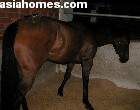 Was
the horse in need of veterinary treatment? Could
he wait till the next day? It was 7.00 pm on this
cool New Year's Eve evening when the phone call came
from the horse owner. I was on the way to the
end-of-the-year dinner after a long day at the surgery
and would rather not make house calls. However, colic calls
seem to occur at dinner time, for some unknown reasons. Was
the horse in need of veterinary treatment? Could
he wait till the next day? It was 7.00 pm on this
cool New Year's Eve evening when the phone call came
from the horse owner. I was on the way to the
end-of-the-year dinner after a long day at the surgery
and would rather not make house calls. However, colic calls
seem to occur at dinner time, for some unknown reasons.
"Mr McKrittle, the riding instructor told me that my horse was lying
down most of the afternoon and suggested that I phoned
the vet," Mrs Simpson said. "Please check him in
case he gets worse in the middle of the
night." There had been a bad case of a horse
developing into severe colicky pains overnight and
collapsed flat out the next morning as the owner waited
for over 24 hours due to economic reasons. A 450-kg
horse, recumbent on the stable floor, breathing rapidly was like a big man
dying in front of you. You could not ignore it.
I felt there was no hope for this dehydrated, shocked
and dying horse. Yet
it did survive after treatment though but the picture of
it breathing its last few breathes etched into the mind
of all horse lovers there. This stretched out on his right side, collapsed from
exhaustion and pain on the stable floor over the
night. His eyes glazing over you, big clouds of breath
sweeping the bedding in front of his nose. It was not a
sight to forget and must have had distressed Peter more
than anybody.
It was hard to diagnose over the phone. The horse was
standing now but he was not eating. The owner said he
was in pain.
"How did your horse show pain?" I asked Mrs
Simpson.
"He always greeted my husband and I with a loud
neigh," said Mrs Simpson. "Now he put his head
down, looked at his cubes and chaff and just would not
eat. He was always hungry and would wolf down his feed
in 2 minutes anytime you feed him." This must
be a very hungry horse which was
unusual.
Signs of colic in a horse are usually mild at the onset.
Lying down, rolling on the back, a lack of interest in
the surroundings and not eating or passing
motions. These are signs of colic. In
thoroughbreds, delay in treatment could lead to drastic
signs of abdominal pain which could be very distressful
for the owner. So, it was better to examine and treat
the fragile racehorse early rather than wait 24 hours
later.
The
horse looked all right when I reached the stable. He put
his head into the feed bin but did 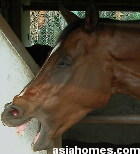 not nibble. He came
to the front of the stall and rolled up his upper lips
and rolled down his lower lips for more than five
seconds showing his long 8-year-old worn incisors and
pink gums. Was he going to bite me? A very small number of
racehorses do bite. Some stablehands had
their own ear lobes bitten off and I was careful. not nibble. He came
to the front of the stall and rolled up his upper lips
and rolled down his lower lips for more than five
seconds showing his long 8-year-old worn incisors and
pink gums. Was he going to bite me? A very small number of
racehorses do bite. Some stablehands had
their own ear lobes bitten off and I was careful.
The gelding repeated wrinkling of his lips for at least
six times continuously in front of Mrs Simpson
and me, all within a minute.
Mrs
Simpson explained, "He is making faces when he is in
pain." She knew him too well but this was an unusual behaviour
to exhibit colicky pain in this way. Usually, they would lie down, roll and paw
the ground with their toes continuously. If he was in
pain, I better gave him the pain killers now.
Had he got a fever? His rectal temperature was 38
degrees Celsius which was normal. His abdomen ballooned
out to the side, as if it had lots of flatulence.
I put my stethoscope onto his distended lower belly. If
there were loud intestinal sounds, it meant that the
intestines were active moving feed. Very soft sounds
were heard on his left side and almost no sounds on his
right side. He would have impaction colic or
constipation. What was the cause of his colic? He
looked very fit as I could see that he had just a bit of
ribs shown over a muscular body. No biting insects had
attacked his shiny coat of skin unlike a few of the
other horses in the open stables.
"He would not neigh when he saw me," Mrs
Simpson said. This was not his usual greeting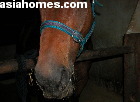 behaviour.
Some racehorses that greet their beloved owners with
loud neighing sounds. behaviour.
Some racehorses that greet their beloved owners with
loud neighing sounds.
He made faces again like people do grimace when they are
in pain too. Maybe he had a headache.
Mrs Simpson said he had six colic incidents in the last
two years and a veterinarian said he might be suffering
from stomach and intestinal ulcers? Mrs Simpson
had given him the ulcer medication prescribed by a
veterinarian. It was just not practical and too
expensive to check a horse for gastrointestinal ulcers
using endoscopes and detailed X-rays and barium meals.
It would cost a few thousand dollars to do all these
test under general anaesthesia and hence it was not
usually done.
If the anti-ulcer medication worked, the horse should
not get colicky episodes. Well, it was New Year's eve
and the stablehand might not have given him his
medication from the container, Mrs Simpson postulated.
It was hard for a stablehand to account for his
medication efforts since there was no transparency and a
language barrier between the stablehands who are usually
not clever enough to market their efforts to the horse
owners.
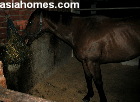 "Why not dole out the medication in 20-ml syringes
so that the stablehand would give one syringe a
day?" I proposed. Mrs Simpson had not thought of
this although she had syringes for the vitamin
supplementation. She said it was a good idea. We went to
my car and I gave her some syringes. In this way, both
she and the stablehand would be happy.
"Why not dole out the medication in 20-ml syringes
so that the stablehand would give one syringe a
day?" I proposed. Mrs Simpson had not thought of
this although she had syringes for the vitamin
supplementation. She said it was a good idea. We went to
my car and I gave her some syringes. In this way, both
she and the stablehand would be happy.
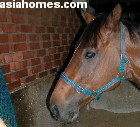 The
anti-colic injections gave him immediate relief. His
neigh would wake up all the other horses but he was
jubilant. He was high as if he was on Ectascy
pills. The
anti-colic injections gave him immediate relief. His
neigh would wake up all the other horses but he was
jubilant. He was high as if he was on Ectascy
pills.
However, there was not even one episode of him everting
his lips anymore. His eyes shone in the darkness
of the warm evening and his lips moved as if he was
trying to apprehend grass or any feed he could find on
the bedding.
Then, he put his front feet on the ground and tapped the
floor impatiently. First one foot, then the other. After
tapping, he would claw the ground, separating the good
quality wood shavings to form a line. Why would he do
that? Usually this would be a sign of pain in
colicky horses.
Mrs Simpson laughed and said, "He's was telling me
he wanted to eat now, so he stomped his feet!" She gave him his bucket of
cubes and chaff.
"Do not feed the cubes," I said. "They
would worsen the colic. He needed fibres best provided
by chaff or hay."
Why would she find some hay? This was New Year's
eve and each owner would have locked up their
stock. She found some hay from her friend's
box, put them inside a net and wet the
hay. Without the net, her horse would gulp all
down within a few seconds. Her horse snapped at the hay
trying to pull them out with his lips. Some fell onto
the wood shavings on the floor. He preferred to eat from
the floor, but the net was excellent in retaining the
hay.
What a ravenous horse. The way he chomped at the hay, I
thought he had been starved for weeks. Mrs Simpson
assured me that he was always hungry. He would kick
other horses away from sharing his feed in the paddock.
Now that he looked all right, I said good bye to Mrs
Simpson. She said she would check on him later in the
night. "This horse would recover," I said.
"Sometimes, he could not pass urine as the
constipated stools in the intestines weigh down on his
bladder and once he was able to pass urine, he would be
fine."
He had mild signs of colic and given pain killers, he
would feel much better and live to the New Year's Day.
He recovered the next day and was back to work, or to
the horse, back to what he liked best - exercising
amongst tall trees, sparrows, butterflies and on the
green tracks of Singapore's most picturesque riding
club.
This was a case "saved" by the alertness of the riding instructor and
the concern of Mrs
Simpson. Nobody
would know whether this horse would develop into severe
colic and stressed out overnight without treatment but
all horse lovers would not want to take the risk
when modern medicine is effective and available.
Advertisement.
House owners:
You got tenant?
If not, place an affordable targeted asiahomes.com
internet ad for $13.50 for 90 days, not just one day as in the newspaper.
You may get the agents to call you and close early so that you can rent out faster and let
the tenant pay for your mortgages.
Why not place an affordable internet ad
to contact prospects direct and save you
a few thousand dollars in agency commission?
Telephone +65 9668 6468, judy@asiahomes.com
Asiahomes Internet, Affordable Internet Ads for Singapore Owners & Realtors,
$13.50/40 words/90days targeted at expatriates relocating to Singapore. Visit http://www.asiahomes.com to select your rental housing
units or to view over 2000 photographs and layout plans.
Copyright © Asiahomes Internet, 2003. All rights reserved.
Revised: January 02, 2003
· Asiahomes Internet
HOW TO
ADVERTISE? | WHY
ADVERTISE? | FAQ
| EMAIL ADVERT
Asiahomes
Internet
asiahomes.com/singapore_classified
Blk 1002, Toa Payoh Lor 8, #01-1477,
Singapore 319074, Republic of Singapore
Mobile Tel: +65 9668 6468, 9668 6469
Tel: +65 6254 3326, 6254 2728
Fax: +65 6256 0501, 64545 843
Email: judy@asiahomes.com
|